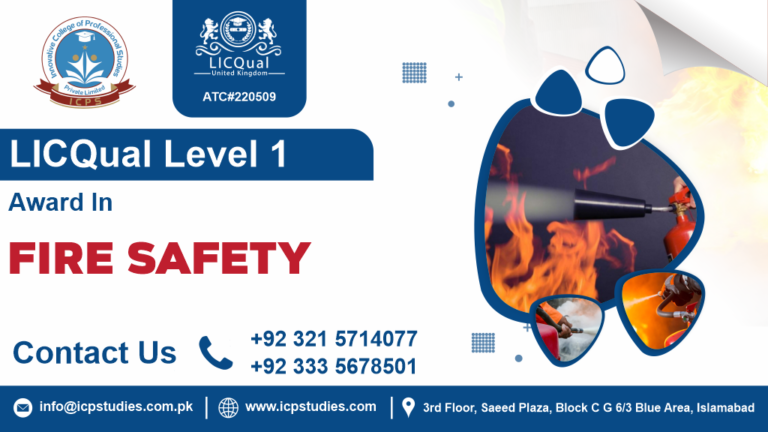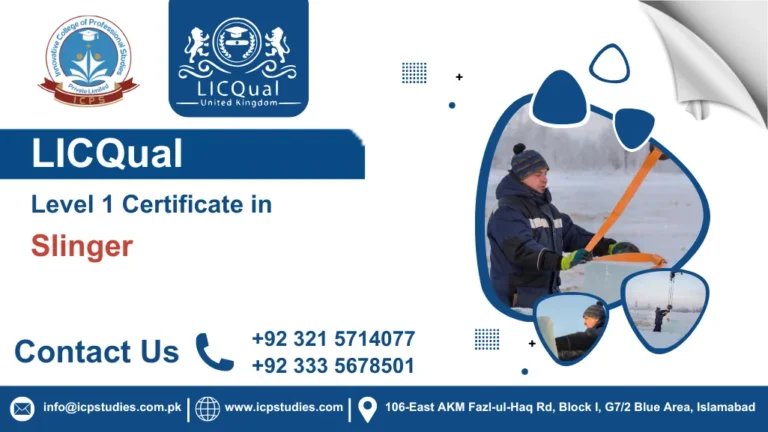This course goes beyond basic first aid training, providing in-depth instruction on managing complex medical emergencies, traumatic injuries, and critical incidents that may occur in the workplace.
Employers have a legal responsibility to ensure the health and safety of their employees. The Level 4 Award in First Aid at Work meets regulatory standards and helps organizations fulfill their duty of care by having trained first aid personnel on-site.
Accredited by LICQual, a leading awarding organization, this certification is recognized and respected across various industries and sectors. It demonstrates your competency in providing advanced first aid assistance in the workplace.
Our course can be tailored to meet the specific needs and risks of your workplace. Whether you work in construction, manufacturing, healthcare, or any other industry, we adapt the training to address the unique hazards and challenges you may encounter.
Theory is important, but practical skills are essential. Our training includes realistic scenarios, simulations, and hands-on exercises to ensure you’re well-prepared to respond confidently in real-life workplace emergencies.
Don’t wait for an emergency to realize the importance of advanced first aid training in the workplace.. Enroll now in the LICQual Level 4 Award in First Aid at Work and become a certified first aid responder who can make a real difference when it matters most. Invest in your skills, protect your colleagues, and ensure a safer, healthier work environment for everyone.
All About Level 4 Award in First Aid at Work
Course Overview
The LICQual Level 4 Award in First Aid at Work is an advanced training program designed to equip individuals with comprehensive knowledge and advanced skills in workplace first aid. Accredited by LICQual, a recognized awarding organization, this course is specifically tailored to meet the needs of individuals who are designated as first aiders in the workplace or those seeking to advance their skills in workplace first aid.
Participants learn advanced techniques for assessing and triaging medical emergencies in the workplace. This includes comprehensive assessment skills to identify life-threatening conditions and prioritize treatment accordingly.
The course covers advanced life support interventions, including advanced airway management, cardiac monitoring, and medication administration. Participants learn to perform advanced cardiopulmonary resuscitation (CPR) and use automated external defibrillators (AEDs) effectively.
Participants gain proficiency in managing traumatic injuries commonly encountered in the workplace, such as severe bleeding, crush injuries, burns, and musculoskeletal injuries. Advanced techniques for wound care, splinting, and immobilization are covered in detail.
The curriculum includes a comprehensive study of various medical emergencies that may occur in the workplace, including cardiac emergencies, respiratory distress, diabetic emergencies, and allergic reactions. Participants learn advanced interventions and medication administration for managing these conditions.
Participants gain an understanding of workplace hazards and health risks specific to their industry or workplace environment. This includes recognizing and responding to occupational health emergencies, chemical exposures, and environmental hazards.
The course covers legal and regulatory requirements related to workplace first aid, including employer responsibilities, reporting procedures, and compliance with health and safety legislation. Participants learn how to maintain accurate records and documentation of first aid incidents.
Upon successful completion of the LICQual Level 4 Award in First Aid at Work course and assessment, participants receive a certification that is recognized nationally or internationally, depending on the accrediting organization. This certification demonstrates competency in providing advanced first aid assistance in the workplace and fulfills regulatory requirements for workplace first aid provision.
Study Units
Learning Outcomes
Here are the outcomes for each study unit:
- Legalities, Responsibilities, and Reporting:
- Understand the legal obligations and responsibilities associated with providing first aid in the workplace, including employer duties, reporting requirements, and compliance with health and safety legislation.
- Learn how to maintain accurate records and documentation of first aid incidents, including incident reports and casualty assessments.
- Incident Management and Primary Assessment:
- Develop proficiency in managing first aid incidents effectively, including assessing the scene for safety, prioritizing treatment, and performing primary assessments to identify life-threatening conditions.
- Learn how to communicate effectively with emergency services and other personnel involved in the incident management process.
- Resuscitation and Defibrillation:
- Gain competency in performing cardiopulmonary resuscitation (CPR) according to current guidelines, including techniques for chest compressions, rescue breathing, and the use of pocket masks or barrier devices.
- Learn how to operate automated external defibrillators (AEDs) safely and effectively, including recognizing when to use an AED and following proper protocols for defibrillation.
- Managing Unconscious Casualties:
- Acquire the skills and knowledge needed to assess and manage unconscious casualties effectively, including conducting secondary assessments, monitoring vital signs, and providing appropriate care and support until help arrives.
- Learn how to recognize and respond to common causes of unconsciousness, such as head injuries, cardiac events, and drug overdose.
- Wound Management and Injury Care:
- Develop proficiency in wound management techniques, including wound assessment, cleaning, and dressing application.
- Learn how to recognize and manage various types of injuries, such as cuts, lacerations, abrasions, puncture wounds, and burns, to prevent infection and promote healing.
- Medical Emergencies in the Workplace:
- Gain knowledge and skills in recognizing and responding to common medical emergencies that may occur in the workplace, such as heart attacks, strokes, seizures, and diabetic emergencies.
- Learn how to provide initial care and support to individuals experiencing medical emergencies until professional medical help arrives.
- Major Illnesses and Chronic Conditions:
- Understand the signs and symptoms of major illnesses and chronic conditions that may impact employees in the workplace, such as asthma, epilepsy, diabetes, and severe allergies.
- Learn how to provide appropriate first aid interventions and support to individuals experiencing symptoms of major illnesses or chronic conditions, including medication administration and monitoring vital signs.
By the end of this course, participants will have acquired the knowledge, skills, and confidence to respond effectively to a wide range of workplace emergencies and medical incidents. They will be equipped to fulfill their legal responsibilities, provide immediate first aid assistance, and promote a safer and healthier work environment for all employees.
Admission Criteria
Entry requirements for the LICQual Level 4 Award in First Aid at Work typically include:
- Minimum Age Requirement: Participants must meet a minimum age requirement, usually set at 18 years old or above. This ensures that participants have the maturity and responsibility necessary to handle the content and practical aspects of advanced first aid training.
- Basic First Aid Certification: While not always mandatory, some training providers may require participants to hold a basic first aid certification before enrolling in the Level 4 Award in First Aid at Work. This ensures that participants have a foundational understanding of first aid principles and techniques before advancing to more complex topics.
- Occupational Health and Safety Awareness: Participants should have a basic understanding of occupational health and safety principles and practices relevant to their workplace. This includes knowledge of workplace hazards, risk assessment, and emergency response procedures.
- Physical Fitness: While no specific physical fitness requirements are mandated, participants should be capable of performing basic first aid maneuvers, including CPR compressions and assisting with moving injured individuals if necessary. Individuals with mobility issues or medical conditions that may hinder their ability to participate in practical exercises should inform course instructors beforehand to ensure appropriate accommodations are provided.
- Language Proficiency: As the course materials and assessments are typically conducted in English, participants should have a sufficient understanding of the language to comprehend instructions, participate in discussions, and complete written assessments.
- Pre-Course Reading: Some training providers may recommend or require participants to complete pre-course reading or online modules to familiarize themselves with advanced first aid concepts and terminology before attending the course. This helps ensure that participants have a foundational understanding of advanced first aid principles, allowing for a more effective and efficient learning experience during the training sessions.
It’s essential for prospective participants to review the specific entry requirements outlined by the training provider offering the Level 4 Award in First Aid at Work, as requirements may vary slightly depending on the organization and jurisdiction. By ensuring that they meet the entry requirements, individuals can maximize their learning experience and successfully complete the course to become certified in advanced workplace first aid.
Ideal Candidate
This comprehensive training program caters to a diverse range of professionals and roles, making it suitable for:
- Workplace First Aiders: Individuals designated as workplace first aiders or appointed to take on first aid responsibilities in their organization. This includes safety managers, supervisors, and employees tasked with providing immediate assistance in the event of workplace accidents or medical emergencies.
- Health and Safety Personnel: Occupational health and safety professionals, including safety officers, risk assessors, and health and safety managers, seeking to enhance their expertise in workplace first aid and emergency response. This course equips them with the knowledge and skills needed to ensure a safe and healthy work environment for all employees.
- Emergency Response Teams: Members of workplace emergency response teams, such as firefighters, paramedics, and emergency medical technicians (EMTs), benefit from advanced training in workplace first aid to effectively manage medical emergencies, traumatic injuries, and critical incidents in the workplace.
- Healthcare Providers: Nurses, paramedics, and other healthcare professionals working in occupational health or industrial settings can expand their knowledge and skills in workplace first aid to better serve their patients and colleagues. This course provides them with specialized training tailored to the unique challenges and hazards present in the workplace environment.
- Safety Consultants: Occupational health and safety consultants and advisors who provide expertise and guidance to organizations on workplace safety and compliance. This course enhances their professional credentials and equips them with practical skills to support their clients in implementing effective first aid protocols and procedures.
- Employers and Managers: Employers, business owners, and managers responsible for ensuring the health and safety of their workforce benefit from understanding advanced first aid principles and legal responsibilities. This course provides them with the knowledge and confidence to develop and maintain a robust workplace first aid program.
- Individuals Seeking Career Advancement: Individuals seeking to advance their careers in health and safety, emergency response, or related fields can benefit from obtaining advanced first aid certification. This course enhances their professional credentials and increases their employability in roles that require expertise in workplace first aid and emergency response.
In summary, the LICQual Level 4 Award in First Aid at Work is suitable for a wide range of professionals and roles within the workplace environment. Whether you’re a designated first aider, a safety professional, an emergency responder, or a healthcare provider, this course equips you with the advanced knowledge, skills, and confidence needed to effectively manage workplace emergencies and ensure the safety and well-being of all employees.
FAQs about Level 4 Award in First Aid at Work







